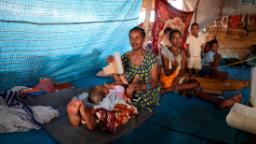[ad_1]

Ethiopian federal forces have been at battle with the regional authorities of Tigray, which borders Eritrea and Sudan, for the reason that starting of November, when Ethiopian Prime Minister Abiy Ahmed introduced a army offensive together with air strikes.
There have since been “frequent bombings in the Tigray capital of Mekelle, including near a church and university,” the humanitarian source instructed CNN, including that scores of individuals have been killed and injured in the area.
Abiy’s authorities didn’t instantly reply to CNN’s request for remark. It has beforehand denied bombing civilian areas and accused Tigray native forces of sheltering army gear in faculties, mosques and church buildings.
On Wednesday, Redwan Hussein, the federal government spokesperson for Ethiopa’s state of emergency activity pressure, instructed CNN that federal troops had been closing in on Mekelle.
The humanitarian source additionally instructed CNN that tens of hundreds have been displaced for the reason that combating started. More than 30,000 Ethiopian refugees have crossed into neighboring Sudan to flee the battle, the UN mentioned earlier this month.
Aid teams working in the area have additionally sounded the alarm of a rising humanitarian disaster and have been urgently calling for entry to the area. An further reported 1.1 million individuals would require pressing help, on prime of the a million already dependent on support, based on the United Nations.
Tigray’s ruling occasion, the TPLF, has refused to give up and has beforehand accused federal forces of killing civilians — a declare that the Ethiopian authorities denies. CNN has not been in a position to confirm claims from both occasion resulting from a communications blackout.
The escalating battle has drawn worldwide requires restraint as political analysts and diplomats warn {that a} slide into civil battle couldn’t solely destabilize the nation of 110 million individuals, however harm the broader Horn of Africa area.
Bethlehem Feleke reported from Nairobi. Zamira Rahim wrote in London.
[ad_2]
Source hyperlink














